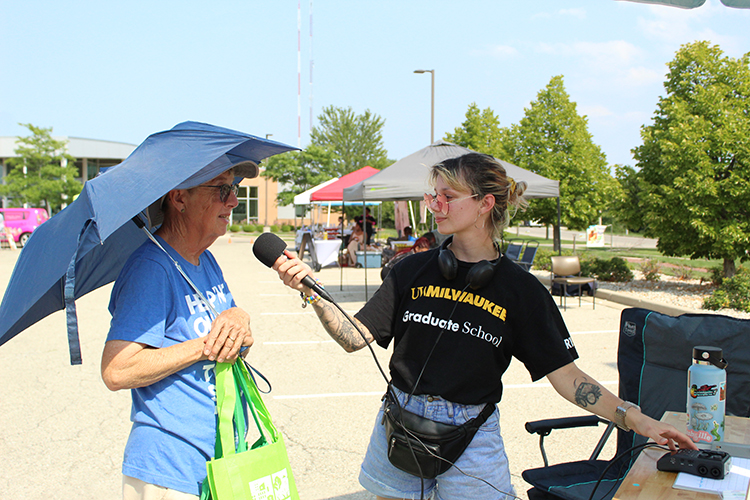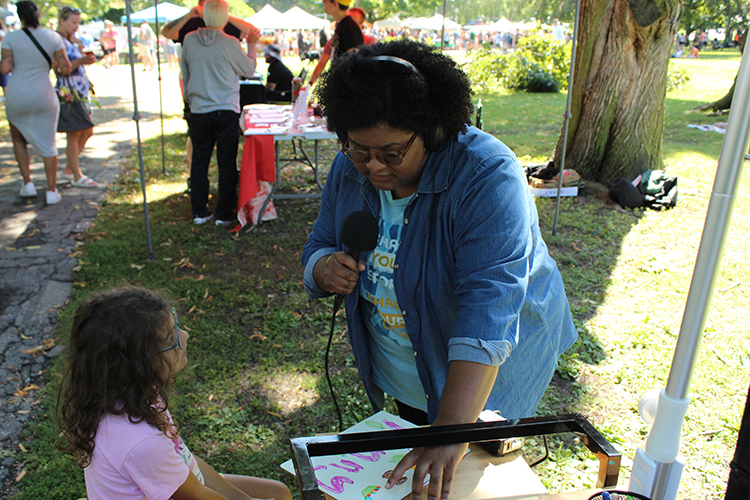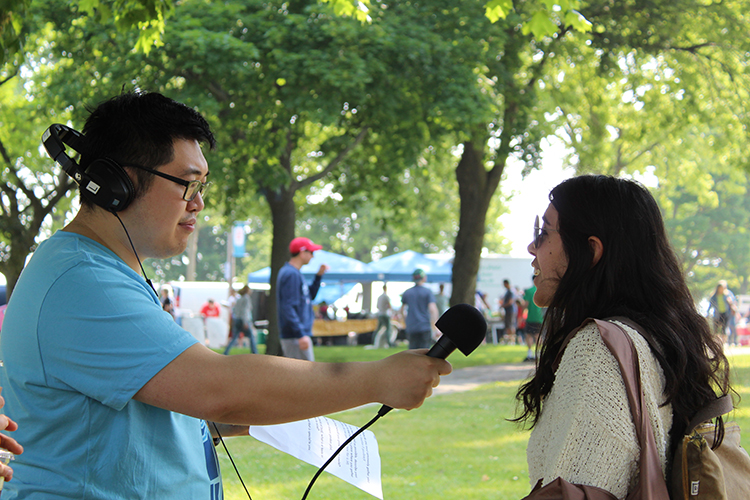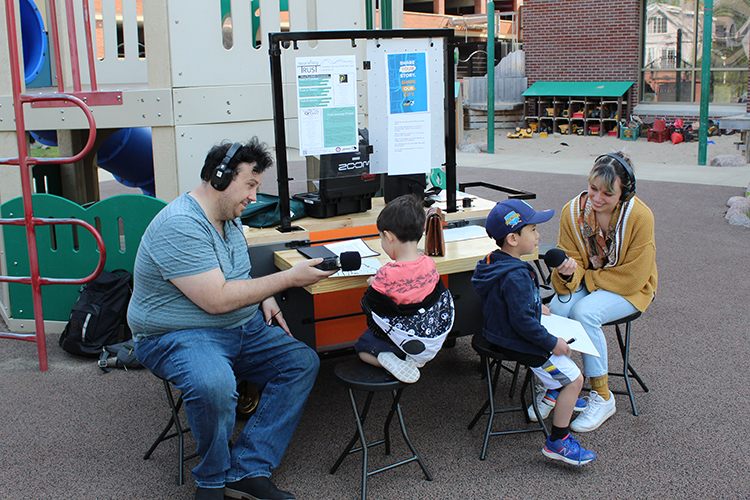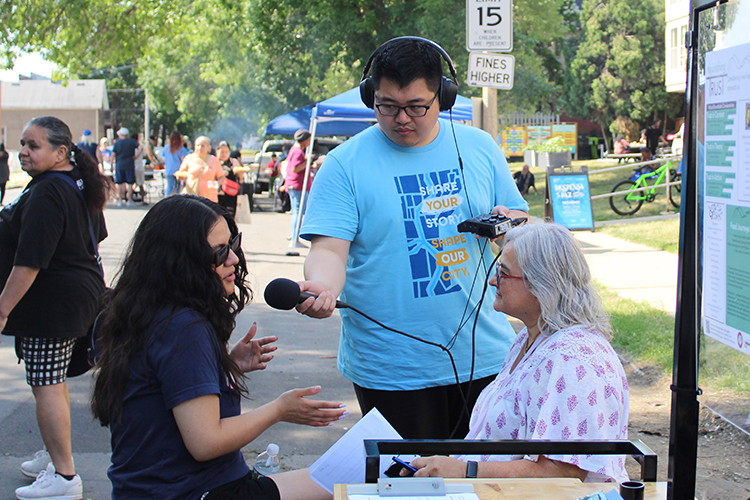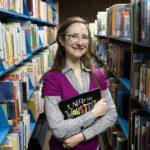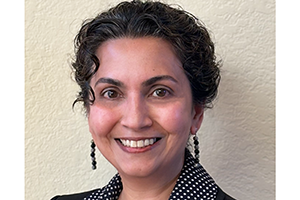Buying or obtaining groceries and preparing food may sound like mundane tasks, but collecting information on how people seek and connect with food can actually foster understanding and help us communicate in a polarized world, said Nicole Welk-Joerger.
Welk-Joerger, former deputy director of UWM’s Center for 21st Century Studies, directed the center’s Story Cart Project, in which UWM graduate students and researchers traveled with a mobile cart to 27 Milwaukee locations to question strangers about food.
They went to grocery stores, farmers markets, food pantries and even a few block parties to record interviews and invite participants, including kids, to talk about or do artwork about food in their lives. Questions included where they usually gather their food, how they get to those places, and what meaningful, trusting food connections look like to them.
“There are historical, sociological, political and environmental conditions that impact why we do the things that we do day-to-day,” Welk-Joerger said. “So those impacts will be incorporated into the stories we collect.”
The Story Cart Project spans multiple years and themes, exploring three topics that foster or push back on ideas of democracy. This year, interviews focused on the theme of “Nourishing Trust” with food stories. Last year’s project, “Lonely No More!,” centered on people’s views about loneliness or connectedness. For next year’s project, which gets underway in spring, the theme is “Trust in the Vote.”
For “Nourishing Trust,” location was key to gathering different kinds of stories, so the C21 researchers chose neighborhoods that reflect Milwaukee’s diverse population.
By summer’s end, the graduate students had amassed more than 10 hours of audio recordings, hundreds of photographs and dozens of drawings. The information has inspired “Milwaukee Food Journeys: A Story Exhibition,” featuring the creative interpretation of artists affiliated with LUNA and True Skool.
The interactive mixed media installation highlights issues of food access, food justice and how Milwaukeeans think about sustenance and trust. The exhibit is on display at The Table, 5305 W. Capitol Drive, until the end of the winter market season.
Where food and democracy intersect
Because the results are closely tied to places, they figure prominently in the next step of the project – mapping the information.
“Mapping this will be a really eye-opening because then you will be able to see that, within only a few minutes’ drive, how different people’s habits are and if that’s by necessity or choice,” Welk-Joerger said. “But we’re also interested in the commonalities it will reveal. Because, if we’re trying to find ways to have hard conversations about public issues, we need to know what we have in common.”
Jessie Thompson, a master’s student in the Sustainable Peacebuilding program, worked as a story cart interviewer during the summer. The program is closely related to other work she is involved in – helping to build a sortable map of all the food actors in the county.
“This will help determine where the needs are. For example, in the Milwaukee ZIP code 53206 there’s a high concentration of food pantries, but not a lot of grocery stores,” Thompson said. “So we’re trying to dig into the system and ask why this is happening.”
An eye-opening experience
For interviewer and doctoral student Jamee Pritchard, the Story Cart experience was often “eye-opening.” She remembers speaking to a nurse who said that every member of her household was employed, yet they still had to supplement their food budget by signing up for SNAP benefits and using food pantries.
“I also noticed that the theme of food and trust came out in the interviews,” Pritchard said. “Many of the people we spoke to said they did not trust the food at traditional grocery stores and preferred to shop at farmer’s markets or stores like Outpost, where they felt more comfortable with the quality and freshness of the food.”
One interviewee, she said, refused to shop in Milwaukee and drove to Madison instead.
Yuchen Zhao, a doctoral student in the Urban Studies Program, also joined the Story Cart team this year. He was drawn by his own scholarship that examines how food places link people and how food is integrated into the family culture.
Food as culture
He remembers a story that came from two Hmong farmers who were selling their produce at the Fondy Farmers Market. Zhao wanted to know what pantry food is common in the Hmong community. Hmong families, the farmers told him, gather to make and eat spring rolls together.
“The entire thing is a social event,” he said. “For my own interests, I wanted to see what the cultural traditions are. Through the stories we’re collecting, we can get a broader understanding of those cultural aspects.”
Others who were involved in the project were AJ Segneri, doctoral student in geography; Haley Rose Steines, master’s student in art history; Muriel Marseille, doctoral student in urban studies; and Spanish translators Maria Julia Baldor and Maria Estrella Sotomayor.
The Nourishing Trust Story Cart Project was funded in part by the USDA’s Supplemental Nutritional Assistance Program – SNAP – with additional support from UWM’s College of Letters & Science, the Center for 21st Century Studies, The Table and Alice’s Garden.
